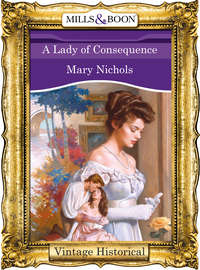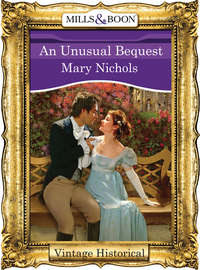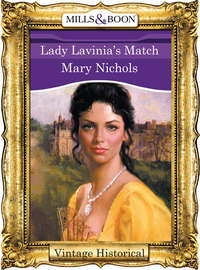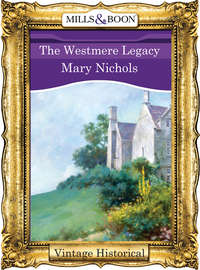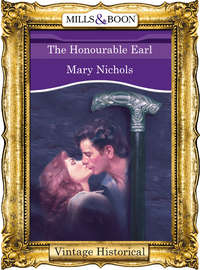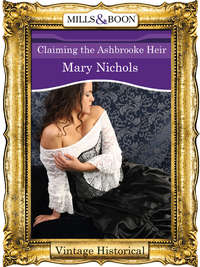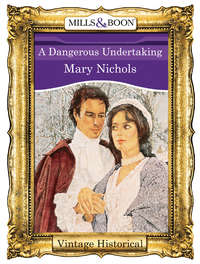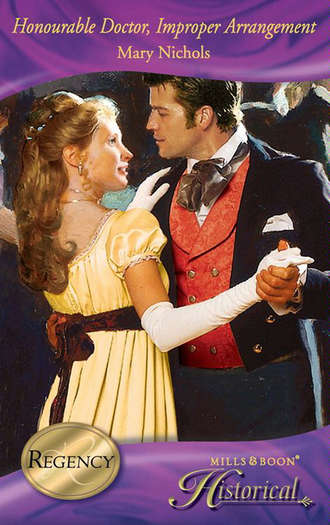
Полная версия
Honourable Doctor, Improper Arrangement
Kate’s seven-year-old brain could not take it all in and it had not made her feel any less bitter at the loss of her mother, nor convince her that if her brother had not been sent away, he would have been well and happy and a playmate for her at the rectory where she was often lonely. She did not want to believe he was dead. Dead of neglect, that was the worst part of it.
As time went by and she grew up, she had begun to understand, to accept that both her mother and brother had gone and that her father was not the ogre she imagined him to be, but an unhappy man who had loved his wife, a little too well, for he had been told she should not have more children. That was why he felt so guilty.
She dragged herself back to the lecture, which was coming to a close.
‘Children are the future of our country,’ the doctor was saying. ‘If they are badly treated, they will grow up knowing nothing else but cruelty and indifference and will pass that on to future generations in the way they treat their own offspring. All children should be adequately fed, clothed and educated, even the poorest…’
There was a slight murmur of disagreement at the mention of education, but he ignored it. ‘We call ourselves civilized, yet we allow cruelty to our children that we would not condone if they were dogs. Foster parents should be licensed and controlled and their premises and the children they care for regularly inspected, but until that happy state is realised, we must do what we can privately. The Foundling Hospital is doing excellent work and there are orphanages who do their best for their inmates, while others are less to be commended. But what of those children who are not orphans, those who have at least one parent without the means and often without the will to look after them?
‘The Society for the Welfare of Destitute Children has been set up to remedy some of these ills. We find respectable and responsible foster homes for the children, until they are able to be returned to their own families, or, when they are old enough, found suitable occupations. We have many influential subscribers, but the list of children needing help in the metropolis alone is growing at an alarming rate, especially since the war, and we need your donations, however small. We also need foster parents to take a child into their homes on a temporary basis. Some of the women who apply are only doing it for the money and have been known to neglect and sometimes ill treat the children. We investigate everyone very carefully before we put them on our books and we pay them enough so there is no excuse to neglect the children.’
He sat down amid restrained applause. Kate turned to look at her father. He was very pale and his hands were trembling. Perhaps she should not have asked him to accompany her; some wounds never heal.
Lady Eleanor rose to introduce the treasurer, who outlined the finances of the society and told his audience what was needed to keep a child in a foster home and visit regularly and how much it cost to keep a child in the Hartingdon Home. The meeting was wound up by the Chairman of the Trustees, who said that their members would be on hand to answer any questions his listeners might have.
Although neither Kate nor her father joined in the debate, the question-and-answer session revealed the disparate views of the audience, some decrying what the society was trying to achieve, others praising it, while still more wanted more information about how the finances were managed. When there were no more questions, the evening was brought to an end and Kate and her father found their way to the front where Simon and Lady Eleanor were in conversation.
Simon’s eyes lit up at the sight of Kate. He bowed. ‘Mrs Meredith, your obedient. Reverend, how do you do?’
Lady Eleanor turned to them. ‘Cousin Thomas, I did not know you were acquainted with Dr Redfern.’
‘We met earlier in the week and he prevailed upon us to attend this evening.’
‘How do you think it went?’
‘You have given us all a great deal to think about.’
Simon smiled. ‘That is all we can ask—that people think about it and do what they can, however little.’
‘I should like to do more,’ Kate said. ‘Even if it is only helping at the Home or raising funds with soirées and concerts. I am sure there are musicians and singers willing to give their services free for such a worthy cause.’
‘We do that already,’ Eleanor said. ‘There is to be a subscription ball at Hartingdon House next Thursday. Would you like tickets?’
‘Yes, please.’
‘I will have them sent to you,’ Simon said, mentally deciding to deliver them in person.
‘How is little Joe?’ Kate asked him as Lady Eleanor left them to speak to one of the other trustees.
‘He is well, but I think he misses his mother, for all that she was glad enough to hand him over to me. He would perhaps be happier in a foster home, but we are very short of those because, as you heard, we are very particular about those we employ.’
‘I am glad to hear that,’ Kate said.
The room was emptying; her ladyship and the other trustees had gone. They bade each other goodnight and went their separate ways.
‘Kate, I do not see how you can become involved,’ her father said as they settled in the family carriage to be driven home. ‘The Viscount will be back in England shortly…’
‘So? If he comes before the ball at Lady Eleanor’s, he can come too. His presence can do nothing but good.’
‘Kate, beware you are not assuming too much. You cannot dictate to Viscount Cranford what he should do.’
‘I would not dream of dictating, but I do not see why he should not listen to my views and support me in something I feel strongly about.’
‘It will not help, you know,’ he said quietly. ‘Regulating foster homes will not undo the past.’
‘No, but it might stop other families grieving as we did.’
‘You blame me, don’t you?’ It was the first time he had ever talked to her about it. ‘You think I did not make sure the wet nurse was clean and healthy. If I had had my wits about me at the time, I would have, then…’ He paused, swallowed and went on, ‘George might have lived.’
‘Papa, stop it. Stop torturing yourself. No one was to blame. I wish now I had not asked you to accompany me tonight. It has been too much for you.’
‘No, it has made me see that something must be done and I shall support Dr Redfern wholeheartedly. I think I will write a tract about it.’
‘Yes, you do that,’ she said, reaching out to cover his hand with her own. He could write tracts or whatever made him feel better; she would offer to help at the Home.
Chapter Three
Next day, Simon, busy in the office of the Hartingdon, going over the case notes of some of the inmates, looked up when the door opened and Kate was ushered in by one of the children who had answered the front door bell. He scrambled to his feet. ‘Mrs Meredith, what are you doing here?’
‘I have come to see how I can be of help,’ she said. She was a picture in her striped gingham dress, with her glossy brown hair peeping out of a very fetching bonnet with silk flowers along its rim and a wide ribbon tied in a bow to one side of her determined little chin.
‘But how did you get here? This is hardly an area for a lady to venture alone.’
‘I assume Lady Eleanor visits, so why not me?’
‘Her ladyship arrives in her own coach and is always accompanied by her companion and a male servant.’
‘None of which I have.’ She said it pleasantly without a hint of envy. ‘I came in a cab. The driver was not anxious to wait, so I let him go. Now tell me, how can I be of use?’
‘Mrs Meredith, you remember I did advise you to think carefully before committing yourself. The children who are housed here are not like the children you were amusing in the park, you know. They are rough and ready and sometimes their language is appalling. Others are withdrawn and uncommunicative.’
She smiled. ‘I am well aware of that, Dr Redfern. There are poor children everywhere. I have always tried to do what I can for them.’
His immediate need was for someone to cook and clean but, mindful of her rank, he could not ask that of her. ‘Do you think you could teach some of the younger ones their letters?’ he asked. ‘Their minds must be fed as well as their bodies.’
‘Of course. I shall be delighted. May I start at once?’
‘I am afraid there is no remuneration apart from expenses.’
‘I do not want wages or expenses; my husband left me adequately provided for and my needs are few. Just being with the children will be payment enough.’
‘You will have children of your own one day,’ he said, knowing he was probing, but curious to know why she had not married again.
‘I hope I may, but that is some way off yet and has no bearing on my wanting to help you.’
He turned to her with a grin. ‘Me or the Society?’
She laughed. ‘Is it not one and the same?’
It suddenly occurred to him that she might be using the opportunity to banish demons of her own—her childlessness perhaps. Ought he to encourage her? But he could not send her away, could he? They had not been so besieged by people offering to help that he could afford to turn anyone away. And he understood about demons. ‘Very well. Let us go and meet the children.’
He took her to the schoolroom, where about twenty children were assembled. The girls were dressed in the uniform of the home: plain grey cotton dresses, white aprons, white mob caps, black stockings and the boys in grey smocks over calf-length trousers. All wore sturdy boots. They were being supervised by a girl of fifteen or so.
‘This is Martha,’ Simon told Kate. ‘She can read a little and it is her task to keep the children occupied when they are not doing their allotted tasks about the house.’
‘Is that all the schooling they get?’
‘No, I have been teaching them myself, but my time is limited and, as you must have deduced last night, educating the children is not considered the most important of our tasks. If you can take over, it will be a great help.’ He clapped his hands to get the children’s attention. ‘Now, you little monsters,’ he said cheerfully, making them grin, ‘Mrs Meredith has come to teach you…’ He ignored the concerted groan and went on. ‘Stand up and say good morning to her.’
They obeyed and Kate returned the greeting with a smile and told them to sit down again. They did so and silently waited. He could almost see their minds ticking over, wondering how far they dare go in tormenting the new teacher. He began to wonder if he had been wise to put her among them; he might have been better giving her some office work to do where she would have minimum contact with them. ‘If I hear of any misbehaviour, there will be beatings and no cake for a week,’ he said. Turning to Kate, he went on, ‘Martha will tell you where the slates and chalks are kept and the books. They have been donated by the church and other improving societies, not designed to grab their attention, I am afraid.’
‘Then we must find some that do,’ she said. ‘But first I must get to know them all.’
‘They will take advantage if they can, so do not stand for any nonsense. Send Michael to fetch me, if you need me. That’s Michael.’ He pointed to a boy of about twelve sitting at the end of the row.
‘I am shocked that you would even consider beating them,’ she murmured.
‘I would not dream of it, but they don’t know that.’ It was whispered with a mischievous grin.
‘Oh, I see. And I am to perpetuate the myth.’
‘It helps,’ he said laconically. ‘Shall I leave you to your fate?’
‘Are you doing your best to make me nervous, Doctor?’
He smiled. ‘I have a feeling I would not succeed, at least not where children are concerned. When you have had enough, just let me know and I will escort you home.’
He left the room and she turned back to the children. They were staring at her silently, sizing her up, and she knew the next few minutes would be crucial. She had spotted Annie Smith, still clutching her doll, and Joe, whose hair, having been washed, turned out to be the colour of ripe corn. ‘Now, children, I need to know what to call you. Stand up, one at a time, and tell me your names; if you know how to spell them, then tell me that too. I know Joe Barber and Annie Smith, and Michael, though I do not know his surname…’
‘Sandford,’ the boy called out, grinning at her. ‘And this ’ere’s Sarah Thomsett.’ He pointed to the girl sitting next to him.
‘Let her tell me herself.’
Simon, standing outside the door listening, smiled to himself. Mrs Kate Meredith was going to be a great asset to the Society—that is, if she did not become discouraged by the children’s lack of progress and decided not to continue. As he walked away, he heard her lilting voice singing ‘oranges and lemons’ and encouraging the children to join in. He could hear them as he returned to his desk and sat down to continue with his work on the records. How happy she sounded!
The time flew by and, before Kate realised it, the morning had gone and Dr Redfern was back to dismiss the children and take her home. He found her sitting on the floor, with Joe on her lap and the others sitting in a circle about her, playing a game that involved remembering a list of everyday articles one after the other in the right order. They seemed genuinely sorry when she stood up and said she must go, carefully removing Joe’s hand from her skirt and promising to come back soon.
‘Did you manage to get your work done?’ she asked Simon as they set off for Holles Street in his gig.
‘Yes, I did, thank you. You were a great help.’
‘I did not teach much in the way of reading and writing,’ she said.
He laughed. ‘They will think that singing and playing games is all there is to education.’
‘It is a great part of it. Learning should be fun. Besides, I needed to hold their interest and gain their trust. I would never do that teaching them from those religious tracts I saw.’
‘Tut tut, and you a parson’s daughter.’
She joined in his laughter. ‘I will bring some more suitable books tomorrow.’
‘So you intend to come again?’ he asked, careful to avoid the worst of the slums and taking a longer route via Pall Mall and Piccadilly, although parts of that were being dug up and houses demolished to make way for the Regent’s new road.
‘Of course, if you will have me.’
‘Have you! My dear Mrs Meredith, you are a godsend. It is not a question of will I have you, but will you want to come.’
‘Oh, I do. I have not enjoyed myself so much in years.’
He was not as calm as he looked. He was acutely aware of her sitting beside him, so close her yellow skirt was brushing against his leg. She was a ray of sunshine and colour in those noisy dust-laden surroundings, but it was not only her external appearance that was so charming, but the inner woman, caring, practical and restful. She was looking straight ahead and he could not see her face properly for the flower-laden brim of her bonnet, but her hands were still in her lap. He did not know why he did it, but he took his left hand from the reins and put it over hers. ‘Thank you for that.’
She looked down at his strong brown hand with puzzlement as if she could not understand how it got there nor why its warmth was spreading down her fingers, making her shiver in spite of the warmth of the day. She knew she ought to remove her hand from under his, but somehow did not want to. It was, after all, only simply a friendly gesture, a sign perhaps that she had pleased him with her efforts with the children, and it would be churlish to take offence. He seemed suddenly to realise what he had done and put his hand back on the reins without speaking.
She turned to look at him, wondering if he noticed the effect his touch had had on her, but he appeared to be concentrating on his driving, carefully going round the road works and turning up Bond Street. ‘I will be glad when they have finished tearing up the streets,’ he said to cover his discomfiture. ‘And all to please the Regent. It is a pity they cannot spend the money on a more worthy cause.’
‘Oh, how I agree with you, though I suppose when the new road is finished, it will be very grand.’
‘Everything our future king does is extravagant. I sometimes wish I could take him by the collar and drag him into Seven Dials. He should see how some of his subjects live while he builds roads and palaces and spends money on his mistresses.’
‘Oh, dear.’ She laughed. ‘You do feel strongly, don’t you?’
‘Yes. It makes my blood boil.’
‘What else excites you?’
He was tempted to say, ‘You do’, but decided that would be a folly. ‘Oh, many things. The plight of the soldiers who have fought for their king and country and are now turned out on the streets to make what living they can. The dreadful business of the slave trade. The way the aristocracy will go to any lengths to keep their estates intact.’
‘Ah, I collect you are the heir to an estate.’
‘Oh, I do not care about that, but when a man is ordered to wed…’
‘Have you been ordered to wed?’
‘I would not obey if I were. At least, not unless I was in love with the lady in question.’ He laughed suddenly to relieve the tension. ‘How did we come to be talking about me? Tell me about yourself.’
‘I am not very interesting. I cannot say I have travelled or served in the army, or healed the sick.’
‘That does not mean you are not an interesting person. Have you always lived in London?’
‘No, my father had a living in Hertfordshire when I was small, but when my mother died…’
‘I am very sorry to hear that.’
‘Thank you. It was a long time ago, when I was seven. She died after giving birth to my brother.’
‘You have a brother?’
‘No, he died too. He was put out to a wet nurse who—’ She stopped. Did she really wish to go over that ground? ‘Papa could not get over his grief and Grandmama suggested he give up the living and move to London. If it had not been for her, I do not know what we would have done. He has since immersed himself in his writing.’
‘I am sorry if I have upset you with my questions,’ he said, beginning to understand some of what drove her to help poor children and why she became so heated over the question of foster mothers. ‘I did not mean to make you sad.’
‘You have not made me sad. It was eighteen years ago and I have learned to accept it was God’s will. We cannot know what He has in store for us and perhaps good will come of it.’
‘Let us hope so.’ They turned into Holles Street. ‘Here we are,’ he said, drawing up outside her door. ‘Are you coming to the Hartingdon again tomorrow?’
‘Yes, of course.’
‘I will fetch you.’ He laughed when he saw her mouth open to protest. ‘And do not argue, it will not make me change my mind.’
She thanked him and he jumped down to hand her down, then drove back to his rooms, musing on the events of the last few days. The arrival of Mrs Meredith was having a strange effect on his state of mind. It was very disturbing, but in a most pleasurable way. He had been so busy with his work for the charity he had had no time for a social life, except when forced upon him by his aunt or the need to raise funds. Mrs Meredith made him want to change all that. He was beginning to look forward to Lady Eleanor’s ball.
It was some time since Kate had been to a society ball; according to Lady Morland, none of her gowns was at all suitable and she must have a new one made and so they had taken a cab to Madame Lorette’s in Bond Street.
The woman called herself Madame Lorette and affected a French accent, but Kate suspected she was as English as she was. On being told Kate’s requirements, she fetched out bolt after bolt of silks, satins, nets, lace and velvet in a myriad of colours. Soon every available surface was covered with material and patterns. It made it harder, not easier, to choose. If Kate liked a particular material, Lady Morland did not; if Lady Morland found a pattern that she considered just the thing, Kate dismissed it as too fussy.
‘But you cannot wear something plain to go to Hartingdon House,’ the old lady said. ‘It will undoubtedly be a very select affair considering the price of the tickets. Fifty guineas is a scandalous amount.’
‘It is in aid of the charity.’
‘Yes, and Eleanor has made sure it will be a very select gathering and there will be no one present who is not of the ton. It will be reported in the newspapers and journals, who was there and what they wore, so you must be suitably attired.’
Kate was unconcerned about what the newspapers might report, but she was looking forward to the ball and perhaps standing up with Dr Redfern. He worked so hard, he deserved a little relief and she hoped he would relax enough to ask her to dance.
‘Well, which is it to be?’ Lady Morland became impatient with her apparent indecision. ‘If you do not choose the material today, there won’t be time to have it made up before the ball.’
‘The aquamarine, I think,’ Kate said, running her hand down the delicate silk. ‘And this pattern.’ She picked up a drawing of a simple round gown with tiny puffed sleeves and a scooped neckline edged with pearls. The high gathered waist was outlined with a ribbon studded with more pearls.
‘Madame will require accessories?’ the modiste enquired, having agreed to deliver the gown three days hence, the morning of the ball, and do any necessary alterations on the spot.
‘Of course,’ her ladyship put in quickly before Kate could say that she would make do with whatever she had in her clothes press at home. ‘Green shoes and cream gloves and that.’ She pointed to a sumptuous silk shawl draped over the back of a stuffed chair. ‘And you may send the account to me.’
‘Grandmother!’ Kate protested; the shawl alone looked very expensive. ‘There is no necessity for you to do that. I can afford to buy my own clothes.’
‘I know you can, but it pleases me to treat you. Considering your father has given me a home, I have little to spend my money on. Now let us go to Gunter’s and have a cup of tea and a slice of cake. I am famished.’
It was only a short step from Bond Street to Berkeley Square and they were soon sitting at a table in the confectioner’s, enjoying the refreshments. ‘I think the green will make up very well,’ the old lady said. ‘It is a pity his lordship will not be back to escort you.’
‘His lordship?’ Kate repeated vaguely.
‘Yes, Cranford. Has he written when he will be home?’
So much had happened in the last week, Kate had almost forgotten about the man she had agreed to marry. Being with the children and Dr Redfern, too, had occupied her mind to the exclusion of all else. ‘No, only that he hoped it would be this summer. He is at the beck and call of the Foreign Office and if they want him in Paris, then he must stay there.’
‘Perhaps you should consider going out to join him.’
‘Marry him in Paris, you mean? Oh, no, I could not do that. I want to be married here, with all my family and friends round me. Besides, if he wanted me to do that, he would have suggested it himself.’
‘Are you not impatient to see him again?’
Kate had to think about that. Was she? Did she have doubts? Had anything changed? The only thing that had altered was that she had had some firsthand experience of looking after children and that made her longing for one of her own greater than ever. ‘Of course I am, but I must be patient. We must both of us be patient.’
The old lady looked closely at her, but decided not to comment. She beckoned to the waiter to pay for the refreshment and asked him to send out for a cab to take them home.
Hartingdon House was in Hanover Square and was a substantial mansion with a wide frontage. On the night of the ball every window was lit and lanterns were strung across the railings. The long line of carriages waiting to go up to the front door contained the cream of London society and people in the street stopped to stare and comment on the guests as they arrived and were admitted.


